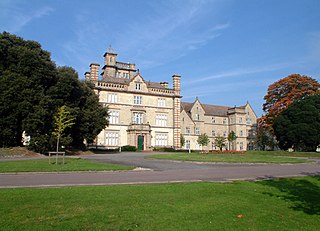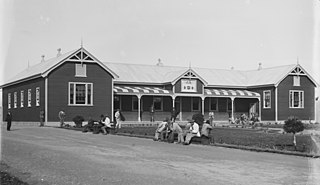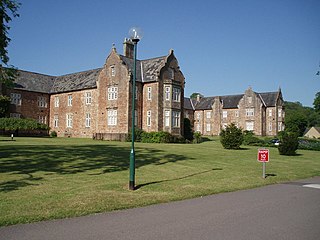
The Royal Earlswood Hospital, formerly The Asylum for Idiots and The Royal Earlswood Institution for Mental Defectives, in Redhill, Surrey, was the first establishment to cater specifically for people with developmental disabilities. Previously they had been housed either in asylums for the mentally ill or in workhouses.

Brookwood is a village in Surrey, England, about 3+1⁄2 miles (5.6 km) west of Woking, with a mixture of semi-rural, woodland-set and archetypal suburban residential homes. It lies on the western border of the Woking Borough, with a small part of the village in Guildford Borough. As part of the 2016 boundary review Brookwood became part of the Heathlands ward which comprises Brookwood, Bridley, Hook Heath, Mayford, Sutton Green and Barnsbury and Wych Hill.

Hugh Welch Diamond was an early British psychiatrist and photographer who made a major contribution to the craft of psychiatric photography.

Fulbourn Hospital is a mental health facility located between the Cambridgeshire village of Fulbourn and the Cambridge city boundary at Cherry Hinton, about 5 miles (8 km) south-east of the city centre. It is managed by the Cambridgeshire and Peterborough NHS Foundation Trust. The Ida Darwin Hospital site is situated behind Fulbourn Hospital. It is run and managed by the same trust, with both hospitals sharing the same facilities and staff pool.

Cane Hill Hospital was a psychiatric hospital in Coulsdon in the London Borough of Croydon. The site is owned by GLA Land and Property.

Claybury Hospital was a psychiatric hospital in Woodford Bridge, London. It was built to a design by the English architect George Thomas Hine who was a prolific Victorian architect of hospital buildings. It was opened in 1893 making it the Fifth Middlesex County Asylum. Historic England identified the hospital as being "the most important asylum built in England after 1875".

Knaphill is a village in Surrey, England, between Woking to the east and Aldershot to the west; to the south and north on the A322 – its western border – are Brookwood, and Bisley. Some of the village is on a hill, hence its name.
Charles Henry Howell FRIBA was the principal architect of lunatic asylums in England during much of the Victorian era. Based in Lancaster Place, London he was a partner in the architects' firm Howell & Brooks.

Hellingly Hospital, formerly the East Sussex County Asylum was a large psychiatric hospital close to the village of Hellingly, east of Hailsham, in the English county of East Sussex.

Woking is a town and borough in northwest Surrey, England, around 22 mi (35 km) from central London. It appears in Domesday Book as Wochinges and its name probably derives from that of a Saxon landowner. The earliest evidence of human activity is from the Paleolithic, but the low fertility of the sandy, local soils meant that the area was the least populated part of the county in 1086. Between the mid-17th and mid-19th centuries, new transport links were constructed, including the Wey Navigation, Basingstoke Canal and London to Southampton railway line. The modern town was established in the mid-1860s, as the London Necropolis Company began to sell surplus land surrounding the railway station for development.

The Seaview Asylum was a psychiatric hospital located to the north of Hokitika, in the West Coast Region of New Zealand's South Island, adjacent to the former Westland Hospital. Open from 1872 to 2009, Seaview trained psychiatric nurses and was once the town's biggest employer.

Whau Lunatic Asylum was a psychiatric hospital on the Oakley Farm Estate in Point Chevalier, Auckland, New Zealand. Built in 1865 on the Great North Road, it was one of the largest asylums in the Colony.

The Manor Hospital, formerly The Manor Asylum and The Manor Certified Institution was a mental handicap and psychiatric hospital in Horton, near Epsom, Surrey, United Kingdom

Netherne Hospital, formerly The Surrey County Asylum at Netherne or Netherne Asylum was a psychiatric hospital in Hooley, Surrey in the United Kingdom.

Graylingwell Hospital was a psychiatric hospital in Chichester, West Sussex, United Kingdom.

St David's Hospital was a psychiatric hospital in Carmarthen, Wales. The main Victorian building is Grade II listed.

Bexley Hospital was a psychiatric hospital at Old Bexley Lane, Dartford Heath, Bexley, in the County of Kent. It operated between 19 September 1898 and 2001.

Mendip Hospital opened in 1848 as the Somerset and Bath Pauper Lunatic Asylum at Horrington, near Wells, in the English county of Somerset.

Bellsdyke Hospital, also known as Stirling District Lunatic Asylum ('SDLA') or Stirling District Asylum, is a former psychiatric hospital at Larbert, Falkirk that was opened in June 1869 and largely closed in 1997. It was an asylum set up by the Stirling District Lunacy Board.






















